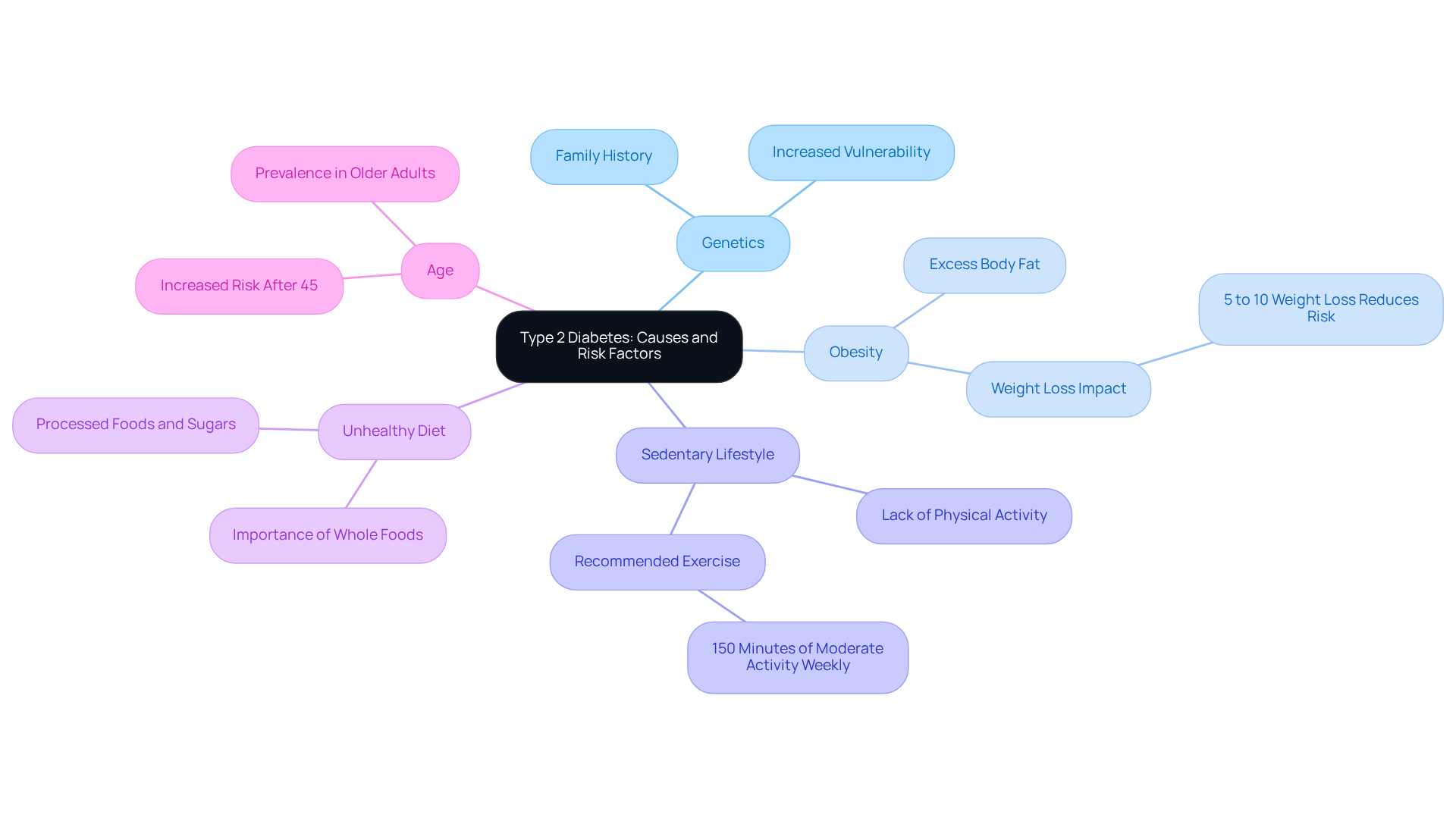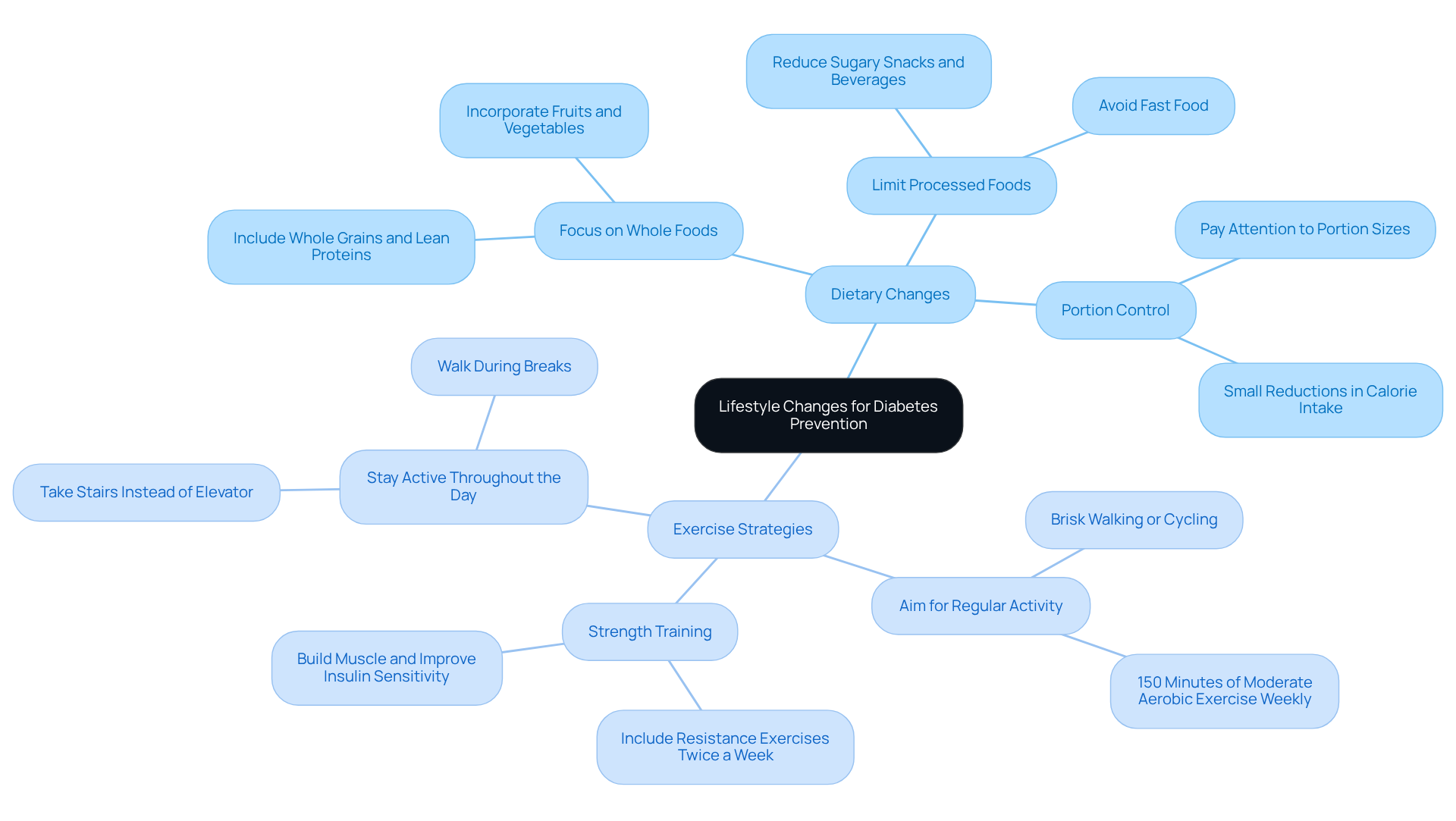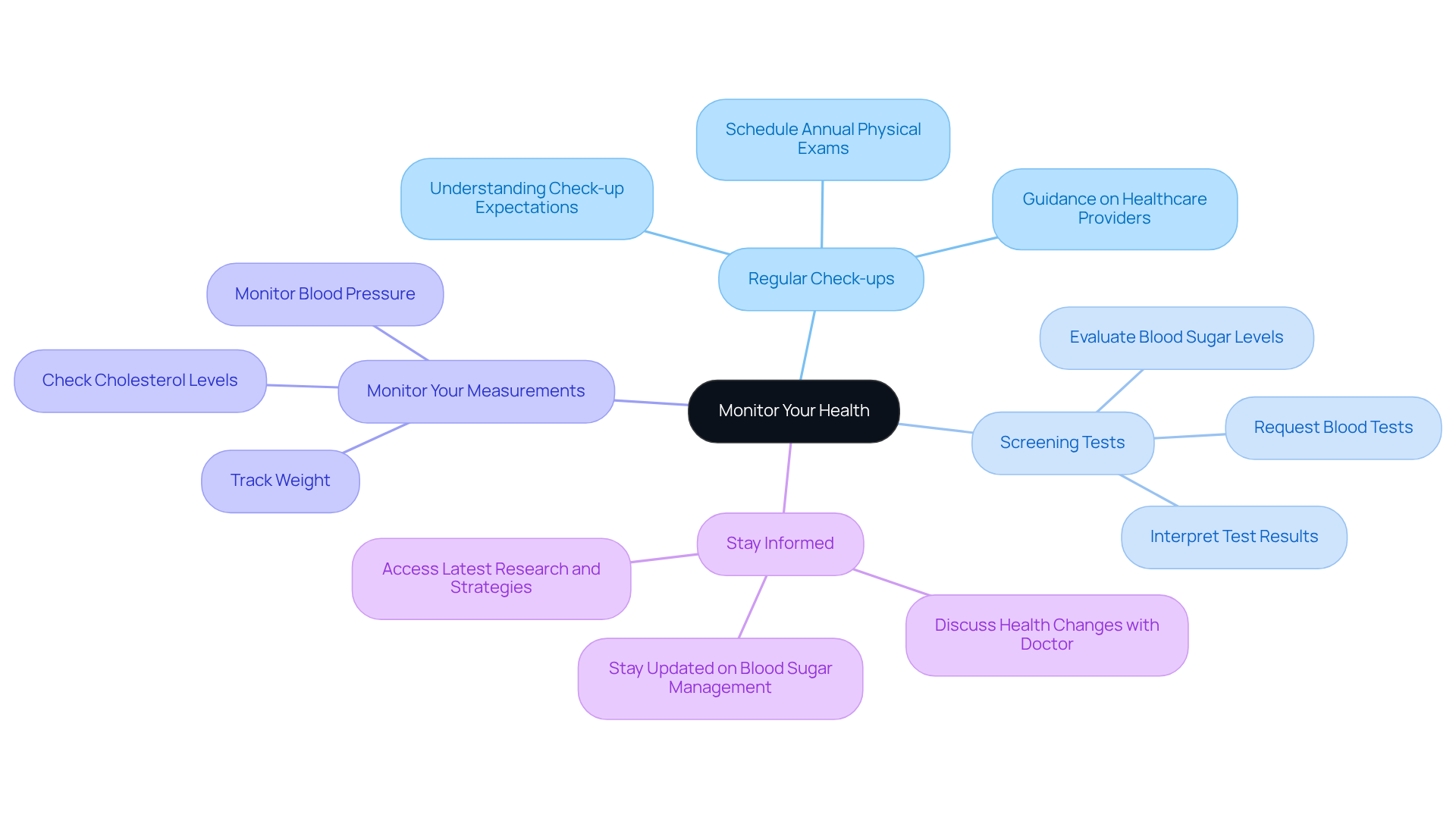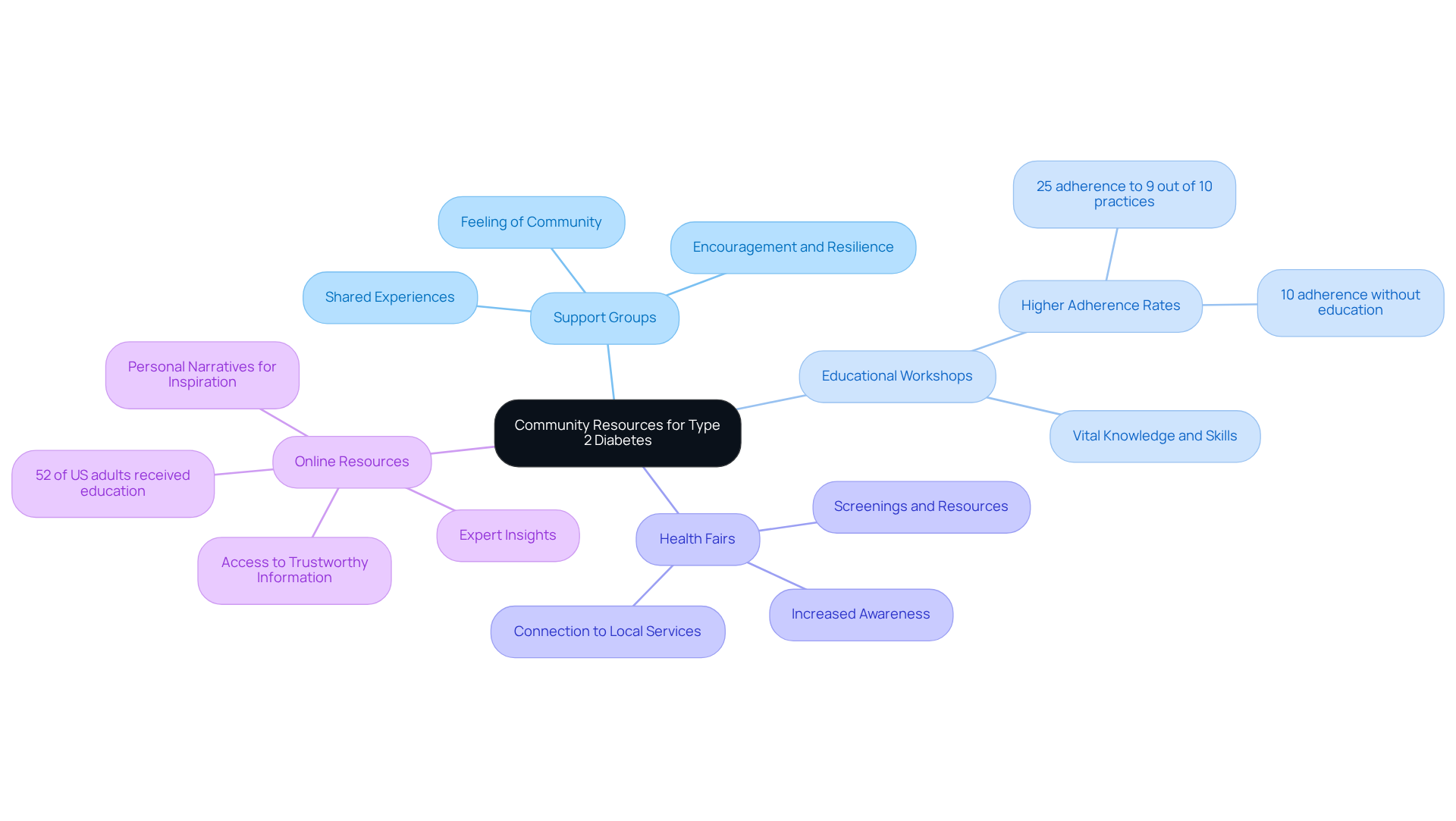Overview
To effectively avoid Type 2 diabetes, it's essential to focus on lifestyle changes that truly matter. Adopting a balanced diet, engaging in regular physical activity, and monitoring your health through routine check-ups can make a significant difference.
You're not alone in this journey; these proactive measures, supported by research and community resources, can significantly reduce risk factors associated with the condition.
It's understandable to feel overwhelmed, but remember, education and community support are vital in managing diabetes prevention. We are here to support you every step of the way. Together, we can navigate this path toward better health.
Introduction
Understanding the complexities of Type 2 diabetes is crucial in a world where its prevalence continues to rise. It's understandable to feel overwhelmed by this condition, primarily characterized by insulin resistance, which poses significant health risks. However, there is hope—proactive steps can be taken to mitigate these dangers.
This article delves into effective strategies for preventing Type 2 diabetes, offering insights into:
- Dietary changes
- Exercise regimens
- The importance of regular health monitoring
You're not alone in this journey; many individuals are seeking ways to improve their health. But with so much information available, how can you discern the most impactful methods to ensure a healthier future? We are here to support you every step of the way.
Understand Type 2 Diabetes: Causes and Risk Factors
Type 2 diabetes is primarily defined by insulin resistance, where the body struggles to utilize insulin effectively. Understanding the key causes can empower you to take proactive steps in managing your health, including how to avoid type 2 diabetes. Let’s explore the main risk factors together:
- Genetics: If diabetes runs in your family, your risk increases significantly. It's important to be aware of this, especially if you have relatives affected by the condition. As researcher Dr. Kelly Wood points out, "Genetics plays a crucial role in determining an individual's vulnerability to Type 2 Diabetes."
- Obesity: Carrying excess body fat, particularly around the abdomen, is a major contributor to insulin resistance. Research shows that losing just 5% to 10% of your body weight can significantly lower your chances of developing this condition. This small step can be a vital part of prevention.
- Sedentary Lifestyle: A lack of physical activity not only contributes to weight gain but also worsens insulin resistance. It’s recommended to engage in at least 150 minutes of moderate-intensity aerobic exercise each week to help combat this risk.
- Unhealthy Diet: Diets rich in processed foods, sugars, and unhealthy fats can lead to obesity and increase the likelihood of blood sugar issues. Embracing a balanced diet filled with whole foods is crucial for prevention.
- Age: The risk of developing Type 2 diabetes increases with age, especially after 45. In fact, the highest prevalence of diagnosed diabetes is found among adults aged 45 and older, underscoring the importance of heightened awareness and preventive measures in this age group.
Additionally, it's essential to recognize the emerging understanding of Type 3 diabetes, which is linked to Alzheimer’s disease and insulin resistance in the brain. By acknowledging these factors, you can better assess your risks and adopt lifestyle changes that promote healthier living, which can help you learn how to avoid type 2 diabetes.
At T2DSolutions, we advocate for a holistic approach to managing blood sugar levels. We encourage you to embrace healthier lifestyles and seek support from healthcare providers. Remember, you’re not alone in this journey; we offer a comprehensive resource hub for education and community involvement to support you every step of the way.

Implement Lifestyle Changes: Diet and Exercise Strategies
To effectively reduce the risk of Type 2 Diabetes, consider these compassionate strategies:
-
Dietary Changes:
- Focus on Whole Foods: It's important to incorporate a variety of fruits, vegetables, whole grains, and lean proteins into your meals. Research suggests that diets richer in plant-based foods, like those advised by the USDA's MyPlate guidelines, can greatly benefit your health and are important for understanding how to avoid type 2 diabetes. Aim for meals that include a quarter protein and a quarter whole grains, as these choices can make a significant difference.
- Limit Processed Foods: Be mindful to reduce your intake of sugary snacks, beverages, and fast food. These factors can contribute to weight gain and insulin resistance, making it crucial to learn how to avoid type 2 diabetes, which can feel overwhelming.
- Portion Control: Remember to pay attention to portion sizes to avoid overeating. Even small reductions in calorie intake can lead to significant weight loss and lower health concerns, helping you feel more in control.
-
Exercise Strategies:
- Aim for Regular Activity: Engaging in at least 150 minutes of moderate aerobic exercise each week, such as brisk walking or cycling, can be a positive step. Studies indicate that regular physical exercise can lower the chances of developing Type 2 conditions, providing valuable insights on how to avoid type 2 diabetes. Dr. William C. Knowler noted that the lifestyle intervention provided insights on how to avoid type 2 diabetes, as it reduced the occurrence of the condition by 58 percent, highlighting the power of these changes.
- Strength Training: Including resistance exercises at least twice a week can help build muscle and improve insulin sensitivity, which is crucial for managing blood sugar levels.
- Stay Active Throughout the Day: Incorporating movement into your daily routine—like taking the stairs instead of the elevator or walking during breaks—can significantly contribute to your overall physical activity levels and help maintain a healthy weight.
Furthermore, consider joining the CDC-led National Diabetes Prevention Program, which offers valuable information on how to avoid type 2 diabetes. This program offers organized assistance for individuals at risk of developing Type 2 conditions. It’s also a wonderful opportunity to connect with others. The organization emphasizes the importance of community involvement, encouraging individuals to share their experiences and interact with others facing similar challenges in diabetes management. Remember, you're not alone in this journey, and there are resources available to support you every step of the way.

Monitor Your Health: Regular Check-ups and Screenings
Proactively monitoring your health is essential for understanding how to avoid type 2 diabetes. It's understandable to feel overwhelmed, but taking small steps can make a significant difference in your journey. Here are key actions to consider, along with resources available through T2DSolutions to support you:
- Regular Check-ups: Scheduling annual physical exams with your healthcare provider is vital for evaluating your overall health. Regular visits can help identify potential issues early, allowing for timely intervention. T2DSolutions offers guidance on finding healthcare providers and understanding what to expect during these check-ups, ensuring you feel prepared and supported.
- Screening Tests: It's important to request blood tests to evaluate your blood sugar levels, especially if you have contributing factors such as being overweight, having a family history of the condition, or being over the age of 35. Prompt identification via screening can greatly lower the chance of developing this condition. T2DSolutions provides information on the types of tests available and how to interpret your results, helping you feel empowered in your health decisions.
- Monitor Your Measurements: Keeping a close watch on your weight, blood pressure, and cholesterol levels is essential, as these metrics can indicate your risk for developing the condition. For instance, nearly 81% of individuals diagnosed with this condition also have high blood pressure, highlighting the interconnectedness of these health issues. T2DSolutions provides tools and resources to assist you in tracking these essential health metrics efficiently, so you're never alone in this process.
- Stay Informed: Engaging in discussions with your doctor about any changes in your health and staying updated on the latest strategies for managing blood sugar is crucial. Knowledge is a powerful tool in managing your health effectively. T2DSolutions acts as a comprehensive resource for the latest research and strategies in diabetes prevention and management, ensuring you have the support you need.
By taking these proactive measures and utilizing the resources available through T2DSolutions, you can significantly learn how to avoid type 2 diabetes while enhancing your overall well-being. Remember, you're not alone in this journey; we are here to support you every step of the way.

Engage with Community Resources: Support and Education
Connecting with community resources can significantly enhance your understanding of how to avoid type 2 diabetes.
- Support Groups: Engaging in local or online support groups allows you to share experiences and receive encouragement from others facing similar challenges. These groups promote a feeling of community and resilience, which is essential for effective management of the condition. You're not alone in this journey; many find comfort in connecting with others who understand their struggles.
Participating in educational workshops focused on how to avoid type 2 diabetes and manage diabetes-related issues can offer vital knowledge and skills. Research indicates that individuals who engage in health education programs are significantly more likely to adopt effective self-management practices. In fact, nearly 25% adhere to at least 9 out of 10 recommended practices compared to only 10% of those who did not receive education. This highlights how important education is in managing your condition effectively.
-
Health Fairs: Community health fairs provide valuable opportunities for screenings, educational materials, and resources. These events not only increase awareness about the condition but also connect individuals with local health services and support networks. It’s understandable to feel overwhelmed, but these fairs can be a great starting point for gathering information and support.
-
Online Resources: Utilizing websites and forums focused on education for type 2 diabetes offers access to trustworthy information and expert insights. The new platform aims to empower individuals and families with extensive resources for managing their condition. We encourage you to subscribe for updates and stay informed about new content and features. Notably, 52% of US adults with the condition reported receiving education on it, emphasizing the importance of accessing reliable information through platforms like this. These platforms often showcase personal narratives that can inspire and encourage you on your health management journey.
By actively engaging with these community resources, including T2DSolutions, you can enhance your understanding of how to avoid type 2 diabetes and build a supportive network that empowers you to take control of your health. Remember, we are here to support you every step of the way.

Conclusion
Understanding how to effectively avoid Type 2 diabetes is crucial for maintaining your long-term health and well-being. By recognizing the risk factors, making informed lifestyle changes, and actively engaging with community resources, you can take significant steps toward prevention. The journey to better health begins with awareness and a commitment to implement positive changes.
Key insights discussed include the importance of addressing:
- Genetic predispositions
- Obesity
- Sedentary lifestyles
- Unhealthy diets
These factors contribute to the risk of developing Type 2 diabetes. Emphasizing dietary modifications, regular physical activity, and routine health monitoring can empower you to lower your chances of developing this condition. Additionally, connecting with community resources and educational programs enhances understanding and support, making your prevention journey more manageable and effective.
Ultimately, taking proactive measures such as adopting a balanced diet, staying active, and utilizing available resources can significantly reduce your risk of Type 2 diabetes. Engaging with healthcare providers and community programs not only fosters a supportive environment but also equips you with the knowledge and tools necessary for successful health management. Remember, you're not alone in this journey—embrace these strategies today to pave the way for a healthier future and inspire others to join in the fight against Type 2 diabetes.
Frequently Asked Questions
What is Type 2 diabetes primarily defined by?
Type 2 diabetes is primarily defined by insulin resistance, where the body struggles to utilize insulin effectively.
What are the main causes of Type 2 diabetes?
The main causes include genetics, obesity, a sedentary lifestyle, an unhealthy diet, and age.
How does genetics influence the risk of Type 2 diabetes?
If diabetes runs in your family, your risk increases significantly. Genetics plays a crucial role in determining an individual's vulnerability to Type 2 diabetes.
What role does obesity play in the development of Type 2 diabetes?
Carrying excess body fat, particularly around the abdomen, is a major contributor to insulin resistance. Losing just 5% to 10% of body weight can significantly lower the chances of developing this condition.
How does a sedentary lifestyle affect the risk of Type 2 diabetes?
A lack of physical activity contributes to weight gain and worsens insulin resistance. Engaging in at least 150 minutes of moderate-intensity aerobic exercise each week is recommended to help combat this risk.
What dietary factors can increase the likelihood of developing Type 2 diabetes?
Diets rich in processed foods, sugars, and unhealthy fats can lead to obesity and increase the likelihood of blood sugar issues. A balanced diet filled with whole foods is crucial for prevention.
How does age affect the risk of Type 2 diabetes?
The risk of developing Type 2 diabetes increases with age, especially after 45. The highest prevalence of diagnosed diabetes is found among adults aged 45 and older.
What is Type 3 diabetes and how is it related to Type 2 diabetes?
Type 3 diabetes is linked to Alzheimer’s disease and insulin resistance in the brain, highlighting the importance of understanding various forms of diabetes.
What approach does T2DSolutions advocate for managing blood sugar levels?
T2DSolutions advocates for a holistic approach to managing blood sugar levels, encouraging healthier lifestyles and support from healthcare providers.
How can individuals seek support in managing their risk for Type 2 diabetes?
Individuals can seek support from healthcare providers and access resources through community involvement and educational hubs like T2DSolutions to help them manage their health.



